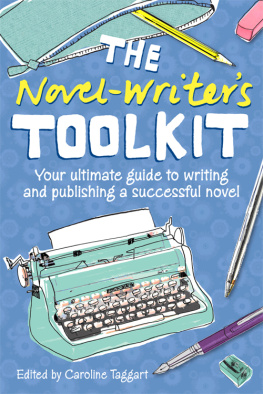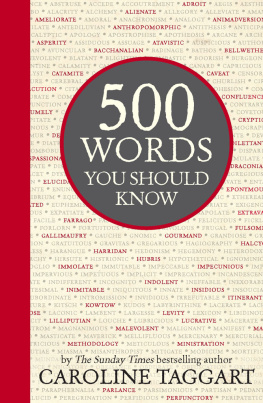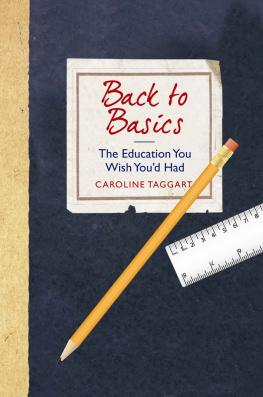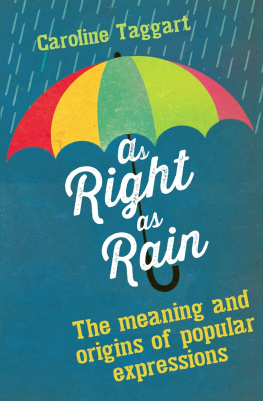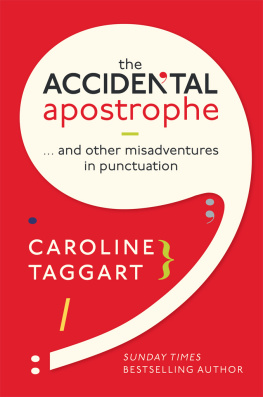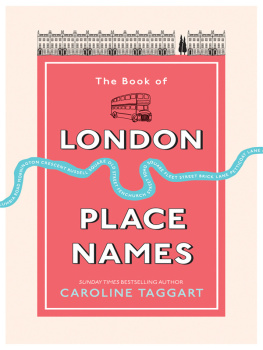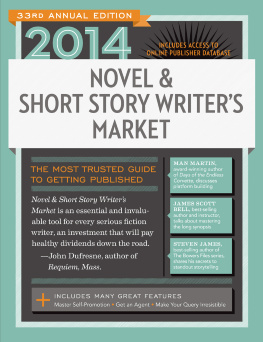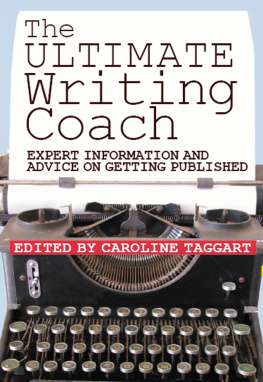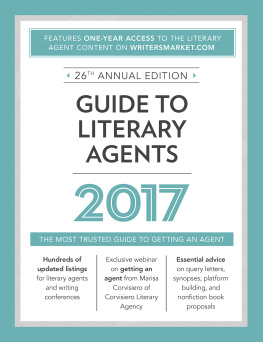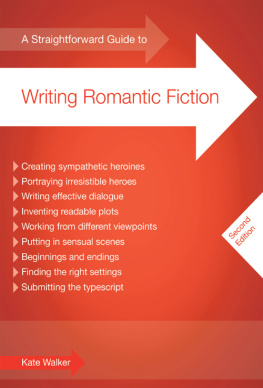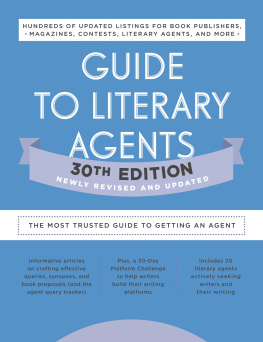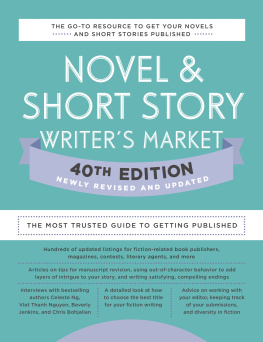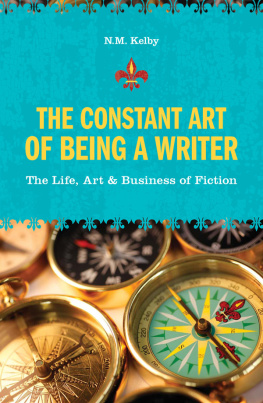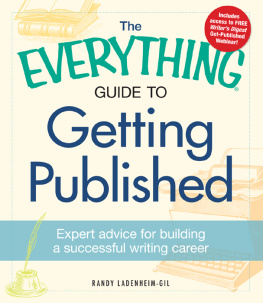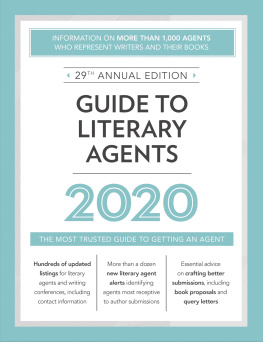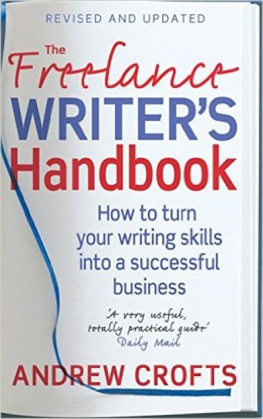THE
Novel-Writers
TOOLKIT
Your ultimate guide to writing and publishing a successful novel

Edited by Caroline Taggart
David & Charles
INTRODUCTION
It may or may not be true that everyone has a novel in them: if you have bothered to pick up this book, its likely that you hope there is a novel in you. Its also likely that you find something about the process of writing a novel and getting it published a little bit daunting.
If so, you have come to the right place. The Novel-Writers Toolkit aims to answer all those questions that are buzzing around in the back of your mind, from How do I start? to How do I find an agent or a publisher?
The book is divided into three parts. The first is designed to make your novel as good as it can possibly be. It deals with the practicalities of being a writer (plonk yourself in front of the computer and stay there is not a bad place to start). There are suggestions on creating plot, characters, setting and dialogue and, eventually, on editing your work so that it is ready to send into the outside world.
Part Two contains invaluable advice from industry insiders, from what an editor is looking for to how to prepare an outline and compose a covering letter that will make a busy agent want to read more. It describes what happens to your manuscript once it has been accepted, considers some aspects of copyright and other legal matters, and gives a salespersons view of what makes a book sell.
Finally, the Directory lists agents and publishers who deal with novels professionals who are potentially interested in your work. The information in each entry is intended to help you decide who might be right for you, so that you dont send a graphic novel to someone who is interested only in literary fiction, or vice versa. There are also details of literary consultancies and writing courses, useful organizations and online resources, competitions, prizes, grants, festivals, conferences and more.
As an aspiring writer, you can imagine that there is nothing more exciting than having a published book with your name on the cover. Its up to you to finish the job, but here are we hope all the tools you need.
ACKNOWLEDGEMENTS
The articles in Part Two and those quoted in Part One originally appeared in Writers Market UK, 2008, 2009 or 2010 editions, published by David & Charles. Their authors are:
Dominic Brendon, currently Key Account Director at the large international publisher Simon & Schuster. Previous to that he was sales director at Kyle Cathie Limited, a smaller independent publisher with a string of bestsellers behind it. His early background was with a London-based bookselling chain where he did 13 years at the coal face.
Simon Brett, who started his professional career as a comedy producer, first for BBC radio and then for London Weekend Television, before becoming a full-time writer. He has published over 80 books, many of them crime novels or psychological thrillers, including the Charles Paris, Mrs Pargeter and Fethering series. His humorous writings include the bestselling How To Be A Little Sod. For radio and television he has written many plays and series, like After Henry and No Commitments.
Sara Crowley, shortlisted for the Faber/Book Tokens Not Yet Published Award in 2007, and winner of the Waterstones 2009 Booksellers Bursary. Her short stories have won prizes and been widely published. She blogs here.
Caro Fraser, author of the bestselling Caper Court series of legal novels and of six stand-alone novels, including A Little Learning and A World Apart. She is currently working on the eighth in the Caper Court series. Her website is www.caro-fraser.co.uk.
Jane Friedman, for 12 years editorial director of Writers Digest Books, Americas leading publisher of how to and inspirational books for writers of all sorts. She now teaches in the e-media department at the University of Cincinnati and speaks at writing and publishing events. Visit his homepage.
Sophie Hannah, a bestselling crime writer. Her latest novel is Lasting Damage (Hodder, 2011) and you can visit her website here.
Penelope Hoare, former Deputy Publisher of Chatto & Windus, an old-established traditional publishing house, now part of Random House, which in its turn is part of the giant international company Bertelsmann. Chatto & Windus owns the Hogarth Press, the publishing company founded by Leonard and Virginia Woolf, and as an imprint still retains its own personality and high standards.
Dr Hilary Johnson, who has edited a writers magazine, taught creative writing and judged writing competitions. She has been organizer of The Romantic Novelists Associations New Writers Scheme and worked as a publishers reader. For many years she has run her own highly regarded Authors Advisory Service and is a scout for a leading literary agent. Visit her here.
Jonathan Pegg, who founded his own agency in 2009 after 12 years at Curtis Brown where he was a senior agent. Prior to becoming an agent he was an agents assistant, foreign rights executive, and publicist for books. He has worked with a range of prestigious authors, and his interests include both fiction (literary fiction, thrillers, historical and quality commercial) and a broad range of non-fiction. Visit his homepage.
Jem Poster, the author of a collection of poetry, Brought to Light (Bloodaxe, 2001) and two novels, Courting Shadows (Sceptre, 2002) and Rifling Paradise (Sceptre, 2006). He is Professor and Director of Creative Writing at Aberystwyth University.
Caroline Taggart, editor of Writers Market UK 2009 and 2010 and a bestselling author in her own right. Her latest book, The Book of English Place Names, is published by Ebury Press.
Much of the information in Part One first appeared in The Everything Guide to Writing a Novel by Joyce and Jim Lavene (Adams Media, 2004).
Part 1 Writing Your Novel
For many would-be writers, finding ideas isnt the problem the hard part is turning them into full-length novels of publishable quality. An idea that seems brilliant for the first few pages may run out of steam; characters and dialogue come out wooden; or there may simply not be enough hours in the day to sit down and write. This section addresses the question of making your work as good as it can possibly be.
THE REALITIES OF BEING A NOVELIST
Organizing Your Life and Your Ideas
Jim Rohn, a motivational speaker, once said, It takes what it takes. He was referring to finding the right place to live your life. For most writers, that place is writing a book. Its a dream that can become reality, but not without some hard work.
It Takes Time
Some people find writing more arduous than others. You may be like Monet, able to finish any project quickly and easily, or more like Michelangelo, taking years to complete what others do in months. Either way, writing a novel is a demanding process. Not only do you have to produce the words in the first place, but you also have to make them the best words they can possibly be: there is always something to be revised or edited. Telling a long, complex tale requires time and patience. If you cant imagine yourself spending hours in front of your computer when other members of your household are asleep or out enjoying themselves, it may be better to focus on some other dream.

